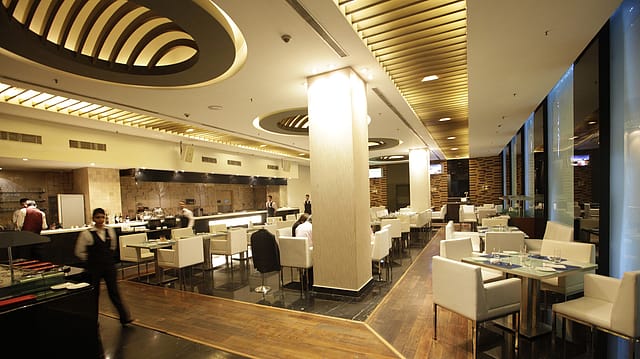Restaurant service charge 'unfair'; Govt to crack down with new law
ADVERTISEMENT

The government said it will soon come up with a robust framework to ensure strict compliance by all stakeholders with regard to service charge levied by restaurants and hotels as it adversely affects consumers on a daily basis.
This comes after the Department of Consumer Affairs (DoCA) on Thursday held a meeting with restaurant associations and consumer organisations on the issue.
The meeting, chaired by DoCA secretary Rohit Kumar Singh, was attended by restaurant lobbies including the National Restaurant Association of India (NRAI) and Federation of Hotel & Restaurant Associations of India (FHRAI) and consumer organisations including Mumbai Grahak Panchayat, Pushpa Girimaji etc.
The government had last month expressed its displeasure over restaurants allegedly making service charges compulsory even though such charges are subject to the customer's discretion.
After taking cognisance of the grievances registered by consumers on the National Consumer Helpline (NCH), the Department of Consumer Affairs (DoCA) had called the National Restaurants Association of India (NRAI) on June 2 to discuss the issue.
Meanwhile, restaurant associations argued that when service charge is mentioned on the menu, it involves an implied consent of the consumer to pay the charge. Service charge is used by restaurants and hotels to pay the staff and workers and is not charged for the experience or food served to the customers, they say.
Consumer rights groups observed that levying service charge is patently arbitrary and constitutes an unfair as well as restrictive trade practice under the Consumer Protection Act. Questioning the legitimacy of such a charge, it was highlighted that since there is no bar on restaurants and hotels on fixing their food prices, including an additional charge in the name of service charge is detrimental to the rights of consumers.
The ministry, in its statement, mentions that the DoCA has already published guidelines, dated April 21, 2017, on charging of service charge by hotels and restaurants. The guidelines note that entry of a customer in a restaurant itself cannot be construed as consent to pay service charge.
The guidelines clearly mention that placing an order by a customer amounts to their agreement to pay the prices displayed on the menu card along with the applicable taxes. Charging for anything other than the aforementioned charges without express consent of the customer would amount to unfair trade practice as defined under the Act, the government says.
"Considering entry of a customer to a restaurant/hotel as an implied consent to pay service charge would amount to imposition of an unjustified cost on customer as a condition precedent to placing an order for food and would fall under restrictive trade practice under the Act. Since this adversely affects millions of consumers on a daily basis, the Department will soon come up with a robust framework to ensure strict compliance by the stakeholders," it adds.